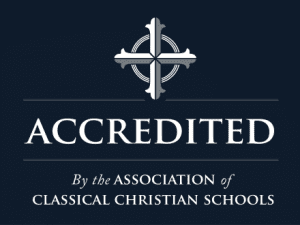ACADEMICS
Goals of a Graduate
At The Ambrose School, our mission is to mature students in Christ as we integrate faith and reason through classical Christian education. To fulfill this mission, we have set six goals for our students and designed our K-12 course of study around these goals.
- Virtue and mature character
- Sound reason and sound faith
- A masterful command of language
- Well-rounded competence
- Literacy with a broad exposure to great books
- An established aesthetic
What makes an Ambrose education unique ?
An education aimed at paideia. Paideia was the word the Greeks used to describe the formation of a whole human being–instruction in the liberal arts, training of the body, and the formation of character. At The Ambrose School, our aim is not merely job preparation or test-taking intelligence, but to shape the whole person–body, mind, and soul–for the glory of Christ and his kingdom.
An education conducted in submission to Scripture and aimed at developing a Christian worldview. We want our students to recognize that all that is good, beautiful, and true in the world finds its source in God. Students consider the ideas and beliefs they encounter in light of the truth of Scripture. We desire to submit ourselves in all things to Jesus Christ.
An education attuned to the three stages of learning–grammar, logic, and rhetoric.
In our Grammar School, we build a foundation for future learning through children’s love of story and the ease with which they memorize. Grammar students memorize songs, chants, and rhymes, Scripture verses, and information from all subjects.
Students in our School of Logic are asking “why” questions in earnest. We harness this tendency by training students in the basics of logic and through Socratic discussion in the classroom.
Students in our School of Rhetoric practice articulating their own ideas winsomely and persuasively. This happens in every class through Socratic discussion, class presentations, written papers, and speeches. Students’ education culminates in thesis projects
An education where history is valued. As Christians, we know that God works throughout human history. We value the past for its witness to God’s character, for its wisdom, and as important for understanding who we are today. Our entire curriculum rotates through the history of the world three times from 2nd through 12th grades.
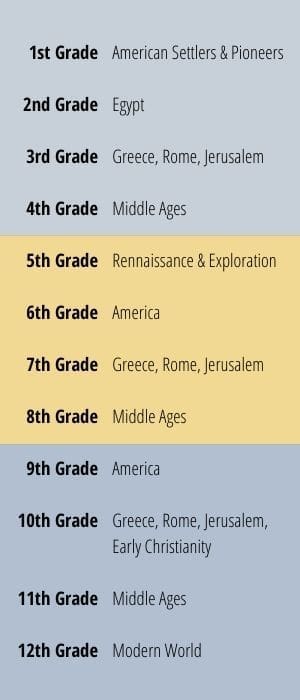
An education rooted in the wisdom of great thinkers and writers. While older is not always better, we honor the preserved, collective intellectual energy of entire civilizations as a body of wisdom to be respected. Our students read the great books of our intellectual tradition to learn from the great thinkers of the past. Through Socratic discussion students enter into conversation with these thinkers, evaluating ideas in light of Scripture and considering how those ideas can inform our living today.
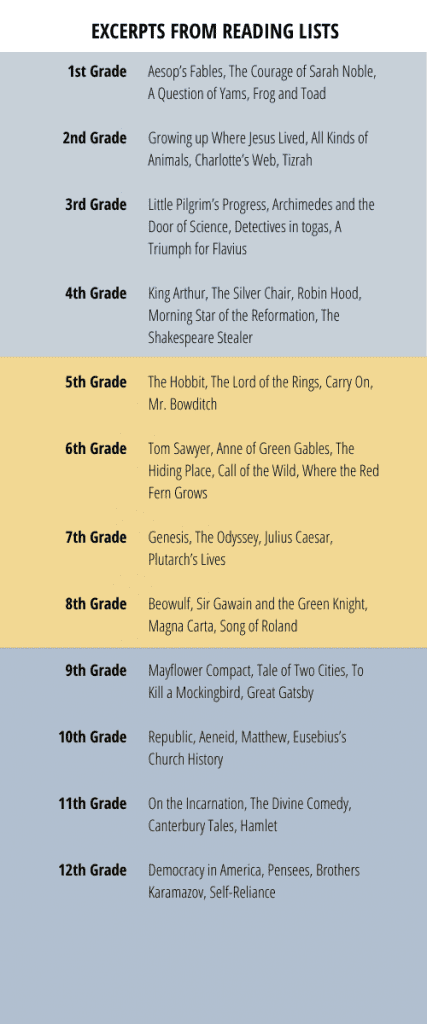
An education where subjects are integrated. School classes are divided into specific subjects–math, literature, art, etc.–but reality is complicated and unified in a way these subject divisions don’t acknowledge. To help our students understand truth that cuts across subject divisions, we encourage integration as often as possible. Through our integrated humanities classes, students consider how the art, history, literature, theology, philosophy and scientific discoveries of a time period all affect one another.
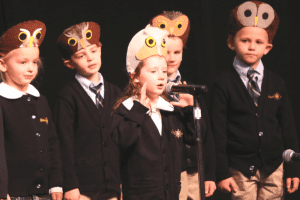 As a kindergartener, your child will listen to stories from Scripture and memorize Scripture verses and the kindergarten catechism on the theme of obeying God.
As a kindergartener, your child will listen to stories from Scripture and memorize Scripture verses and the kindergarten catechism on the theme of obeying God.
Kindergarteners learn to read using Abeka’s phonics curriculum, to print using D’Nealian style of writing, and learn the basics of math using Singapore Math.
Throughout the year, students study different species of birds–their calls, diet, habitats, anatomy, and appearance. Kindergarteners draw and read stories and memorize poems about different birds, and end their year with a field trip to Boise’s Birds of Prey Center.
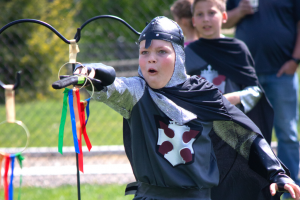 As a fourth grader, your child will learn about the history of Biblical events in Chronicles through Malachi, and learn Scripture passages and the 4th grade catechism on the Christian virtue of love.
As a fourth grader, your child will learn about the history of Biblical events in Chronicles through Malachi, and learn Scripture passages and the 4th grade catechism on the Christian virtue of love.
He or she will build a castle as part of our study of the Middle Ages, draw maps of Europe, explore the world of the Vikings, read about the lives of the Reformers, and celebrate their year with a Medieval festival complete with costumes and a feast!
4th graders practice speaking Latin, continue their study of Math with Saxon ⅚ (changing to Singapore Math in the ’26-’27 school year) and of grammar with Shurley English. They conduct simple experiments to learn about energy, light, electricity and machines, and study space and the lives of great scientists.
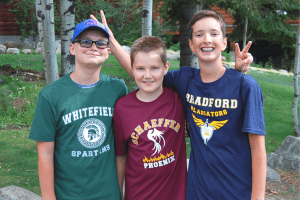 When students enter our upper school (7th-12th grades), they attend for their first time our annual school retreat on Payette Lake in the mountains of Idaho, where they are inducted into one of our eight upper school houses. Members of a house compete in sports and community service and provide mentorship for younger students.
When students enter our upper school (7th-12th grades), they attend for their first time our annual school retreat on Payette Lake in the mountains of Idaho, where they are inducted into one of our eight upper school houses. Members of a house compete in sports and community service and provide mentorship for younger students.
In their humanities course, 7th graders are introduced to the foundational worldview questions such as who is God, what is real, what is a human, how do we know right and wrong, and how should we live? They begin exploring ancient answers to these questions through their study of Greek, Hebrew, Roman, and Christian literature, thought, and art.
Your 7th grade student will take pre-Algebra, physical science, Latin, choir or orchestra, and composition. The last days of the school year, 7th graders create a living history museum, taking on personas and recreating artifacts from their study of ancient history.
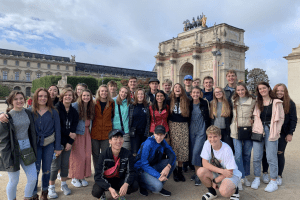 Every fall, our seniors embark on one of the culminating experiences of an Ambrose education–their senior trip to London, Paris, Florence, and Rome. Seniors explore these great cities, experiencing in person the art, architecture, and historical sites they have been studying since kindergarten.
Every fall, our seniors embark on one of the culminating experiences of an Ambrose education–their senior trip to London, Paris, Florence, and Rome. Seniors explore these great cities, experiencing in person the art, architecture, and historical sites they have been studying since kindergarten.
In the final days of their time at Ambrose, every Ambrose student presents and defends a thesis before a panel of community members, addressing a civic issue from a Christian perspective. Seniors study the principles on which the American government is founded, and explore modern world history, philosophy, and literature through Socratic discussion. Seniors can take physics or human anatomy, calculus, and French.
Science and Math
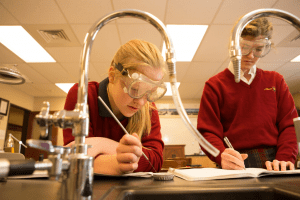 Our science program goal is to cultivate students who will love the Lord first and foremost while gaining an appreciation of the work of the Great Artist. We want students to be scientifically literate with the ability to evaluate scientific content objectively and critically. Using the tenets of classical education blended with modern laboratory practices and methodologies, we strive to develop science proficiency and appreciation.
Our science program goal is to cultivate students who will love the Lord first and foremost while gaining an appreciation of the work of the Great Artist. We want students to be scientifically literate with the ability to evaluate scientific content objectively and critically. Using the tenets of classical education blended with modern laboratory practices and methodologies, we strive to develop science proficiency and appreciation.
In the 9th-12th grades, your student will study biology, chemistry, and physics, and have the option to take human bio. Science courses in the Grammar School and School of Logic foster curiosity and appreciation for the beauty and complexity of the world around us through hands-on experiments, observation notebooks, and lab work.
Our math curriculum promotes integration of logic to understand the conceptual development of mathematical ideas, preparing students to thrive in mathematics. All students study Algebra I, geometry, Algebra II, and trigonometry. We also provide precalculus and Calculus I, both of which can be taken for college credit through our concurrent credit program.
Concurrent Credit
Ambrose students can earn up to 43 college credits through the concurrent credit courses we offer in conjunction with Northwest Nazarene University and Colorado Christian University.
- Chemistry (4 credits with Northwest Nazarene University)
- Human Biology (4 credits with Northwest Nazarene University)
- Calculus (4 credits with Northwest Nazarene University)
- Pre-calculus (6 credits with Northwest Nazarene University)
- Humane Letters III (6 credits with Colorado Christian University)
- Humane letters IV (6 credits with Colorado Christian University)
- Humane Letters V (6 credits with Colorado Christian University)
- Rhetoric I (3 credits, Colorado Christian University)
- Summa Civitas (3 credits with Colorado Christian University)
- Choir (1 credit with Colorado Christian University)
Fine Arts and Applied Arts
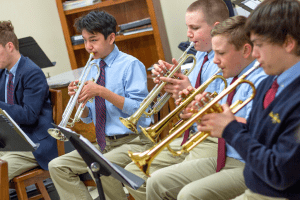 All Ambrose grammar school students take art and music. Our music instruction follows the Kodaly method, in which children are taught foundational concepts of music through folk song, rhythm, listening, games, and movement.
All Ambrose grammar school students take art and music. Our music instruction follows the Kodaly method, in which children are taught foundational concepts of music through folk song, rhythm, listening, games, and movement.
7th and 8th graders either sing in our choir or play an instrument in our orchestra. High school students can participate in our honors choir or orchestra. Students share what they have learned through our annual Christmas Concert in December and our Spring Music and Arts Festival in the Spring.
Our art students study and imitate the works of the great masters using a variety of media.
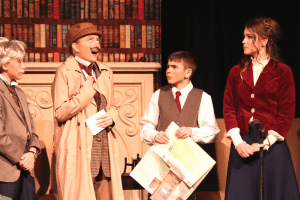 Recent plays performed by our school of logic and our school of rhetoric drama teams include The Importance of Being Earnest, Sherlock Holmes, MacBeth, and The Mousetrap. Our students’ dramatic, rhetorical, and persuasive abilities come together on our Mock Trial teams, who have qualified for state each of the past 10 years. Students’ technical and story-telling abilities come together in our media and yearbook courses.
Recent plays performed by our school of logic and our school of rhetoric drama teams include The Importance of Being Earnest, Sherlock Holmes, MacBeth, and The Mousetrap. Our students’ dramatic, rhetorical, and persuasive abilities come together on our Mock Trial teams, who have qualified for state each of the past 10 years. Students’ technical and story-telling abilities come together in our media and yearbook courses.
Latin
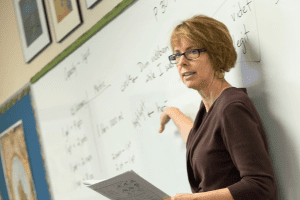 Ambrose students study Latin starting in 3rd grade using story-based and spoken Latin resources. In the upper school, students continue story-based Latin learning and speaking through Lingua Latin and Latin novellas. 10th grade students read Scripture and classical literature in Latin. By studying Latin, students gain deeper understanding of Roman culture and through access to great literature and thought in its original language.
Ambrose students study Latin starting in 3rd grade using story-based and spoken Latin resources. In the upper school, students continue story-based Latin learning and speaking through Lingua Latin and Latin novellas. 10th grade students read Scripture and classical literature in Latin. By studying Latin, students gain deeper understanding of Roman culture and through access to great literature and thought in its original language.
Standardized Test Results
No standardized test can measure the whole-person formation that The Ambrose School seeks to provide your child.
While test results give only a snapshot of a child’s abilities and strengths, students at The Ambrose School do well on standardized tests in comparison with both their public and private school counterparts.



